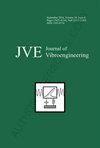Fault diagnosis of low-speed heavy load super large rolling bearing based on deep learning
IF 0.9
Q4 ENGINEERING, MECHANICAL
引用次数: 0
Abstract
The conventional eigenvalue alarm mode has a high rate of false alarm and missed alarm for the low-speed heavy load super large rolling bearing. Besides, the traditional signal processing method such as envelope spectral analysis is difficult to extract its fault characteristic frequencies, resulting in a high rate of false diagnosis and missed diagnosis. In order to solve the above problems, an intelligent diagnosis method for the low-speed heavy load super large rolling bearing based on deep learning is proposed. The proposed method mainly utilizes the strong robustness of deep learning algorithm to the quality of original vibration data in the field of fault diagnosis. Firstly, an effective signal acquisition scheme is designed to solve the problem that the signal characteristics of low-speed heavy load super large rolling element bearing are difficult to be acquired. Then, the collected data are randomly divided into training sets, verification sets and test sets by using data enhancement technology. Subsequently, input the divided training set samples into 1-dimensional convolution neural network (1DCNN) deep learning model for learning and training to construct the 1DCNN learning model and set network structure parameters. Meanwhile, the optimal training model is obtained by validating the updating effect of model parameters through validation set. Finally, the test data is input into the trained model to realize intelligent diagnosis. Effectiveness of the proposed method is verified by the vibration data of a wind power main bearing.基于深度学习的低速重载超大型滚动轴承故障诊断
对于低速重载超大型滚动轴承,传统的特征值报警方式存在较高的虚警和漏警率。此外,包络谱分析等传统的信号处理方法难以提取其故障特征频率,导致其误诊断和漏诊率高。为解决上述问题,提出了一种基于深度学习的低速重载超大型滚动轴承智能诊断方法。该方法主要利用深度学习算法对原始振动数据质量的强鲁棒性进行故障诊断。首先,针对低速重载超大型滚动轴承信号特征难以获取的问题,设计了有效的信号采集方案;然后,利用数据增强技术将采集到的数据随机分为训练集、验证集和测试集。随后,将划分好的训练集样本输入到一维卷积神经网络(1DCNN)深度学习模型中进行学习和训练,构建1DCNN学习模型并设置网络结构参数。同时,通过验证集验证模型参数的更新效果,得到最优训练模型。最后将测试数据输入到训练好的模型中,实现智能诊断。通过某风电主轴承的振动数据验证了该方法的有效性。
本文章由计算机程序翻译,如有差异,请以英文原文为准。
求助全文
约1分钟内获得全文
求助全文
来源期刊

Journal of Vibroengineering
工程技术-工程:机械
CiteScore
1.70
自引率
0.00%
发文量
97
审稿时长
4.5 months
期刊介绍:
Journal of VIBROENGINEERING (JVE) ISSN 1392-8716 is a prestigious peer reviewed International Journal specializing in theoretical and practical aspects of Vibration Engineering. It is indexed in ESCI and other major databases. Published every 1.5 months (8 times yearly), the journal attracts attention from the International Engineering Community.
 求助内容:
求助内容: 应助结果提醒方式:
应助结果提醒方式:


